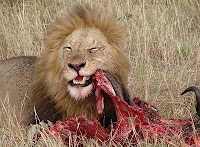During the Exodus, God sent ten plagues upon Egypt (Exodus 7:14-Exodus 11:10). The first plague occurred when Moses raised his staff over the Nile River at God’s request to transform the river’s water into blood (Exodus 7:14-25). The results were immediate and palpable: “The fish in the Nile died, and the river smelled so bad that the Egyptians could not drink its water. Blood was everywhere in Egypt (Exodus 7:21 NASB).”
Many scholars have identified the blood of the first plague with the red silt that characterizes the Nile during its flooding season. Werner Keller (1909-1980) is representative of this rationalistic approach, writing, “Deposits from the Abyssinian lakes often color the flood waters a dark reddish brown, especially in the Upper Nile. That might well be said to look like ‘blood’ (Keller, The Bible As History, 120).”
While this explanation is prevalent, it does not fit the tone of the Biblical account. The text explicitly claims that what was once water was now blood (Exodus 7:17-20) and elsewhere the Bible uses language for water that merely appears to be blood (II Kings 3:22). Further, the natural phenomena that affects the Nile is a gradual transformation, commonly seen as a blessing by the natives, not the immediate curse seen in the text (Exodus 7:18, 21). Silting also does not typically result in the death of fish or produce a stench (Exodus 7:18, 21). The Biblical phenomena actually extended beyond the river to water in “vessels of wood and in vessels of stone (Exodus 7:19 NASB).” As such, the Biblical account goes to great lengths to present a supernatural event.
Do you prefer the natural or supernatural reading of the first plague? Why? Why do you think that the assault on Egypt began with contaminating the water supply?
The Nile was synonymous with Egypt and served as the source of life or disaster for civilizations in Northeast Africa. The Egyptians regarded the Nile’s annual flooding as a manifestation of the god Osiris. In attacking the water, the text pits God against god. The Nile was also where Pharaoh had decreed that all newborn Hebrew males be cast into the river (Exodus 1:22) and attacking it carries a sense of poetic justice.
In areas where it is readily available, one can easily forget just how important water is. Leonardo da Vinci (1452-1519) said “Water is the driving force of all nature.” As can be seen by the death of the wildlife (Exodus 7:18, 21), water affects an entire ecosystem. Water is so important that many scholars have speculated that the other nine plagues represent a chain reaction stemming from the contaminated water source.
Over large parts of the world, humans have inadequate access to potable water. Water.org reports:
- 884 million people lack access to safe water supplies; approximately one in eight people.
- 3.575 million people die each year from water-related disease.
- The water and sanitation crisis claims more lives through disease than any war claims through guns.
- People living in the slums often pay 5-10 times more per liter of water than wealthy people living in the same city.
- An American taking a five-minute shower uses more water than a typical person in a developing country slum uses in a whole day.
“Thousands have lived without love, not one without water.” - W. H. Auden (1907-1973)




